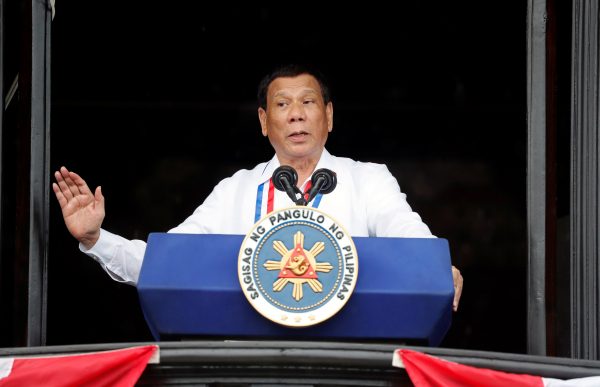Duterte’s populist politics (Dutertismo) mobilises public support through a mix of coercion and charisma. Over the past five years, his government has undermined democracy, human rights and civil liberties while consolidating local and national political control. With the election just a year away, Dutertismo appears to be ready for a second term. Duterte’s daughter Davao City Mayor Sara Duterte-Carpio, his trusted personal assistant Senator Bong Go and the ruling PDP–LABAN party chair Senator Manny Pacquiao are topping the polls in pre-election presidential surveys.
In March 2021, key opposition groups publicly launched the electoral opposition coalition 1Sambayan (‘One Nation’). Its convenors and membership are ideologically diverse, including top appointed government officials from past administrations, as well as civil society leaders from the left, right and even the usually conservative religious sector. Haunted by the opposition’s humiliating defeat in the 2019 midterms, 1Sambayan’s primary goal is to field a single slate for the presidency, vice presidency and senate against Duterte’s successor in 2022.
The coalition claims to represent the country’s democratic forces united against populist rule. But can this new Philippine ‘popular front’ against Dutertismo level the playing field?
A broad coalition is the weak opposition’s best chance of challenging Duterte’s successor. A coordinated opposition slate means that anti-incumbent votes might be able to coalesce around a single candidate. Duterte only got 39 per cent of the vote in the 2016 election.
The process of selecting presidential candidates has been criticised by both the pro-Duterte and anti-Duterte camps. Sara Duterte-Carpio described 1Sambayan as ‘authoritarian’ and guilty of excluding other presidential aspirants. From within the opposition, there are concerns that some of the ‘electable’ candidates being considered have weak opposition experience and credentials, including Senator Grace Poe and Manila Mayor Isko Moreno. There is also a question about whether Vice President Leni Robredo and her supporters will accept anything less than a presidential candidacy.
The organisational shape of 1Sambayan is also a concern from within the opposition. The movement is primarily made up of the old guard in the respective groups — well-regarded but possibly out of touch with the Duterte public. To some the coalition’s messaging is overly moralistic and elitist. Its slogan ‘Tapat Na Pamumuno’ (Honest Leadership) resembles the lacklustre Liberal Party’s ‘Disenteng Pilipino’ (Decent Filipino) in 2016 and the previous administration’s slogan of ‘Daang Matuwid’ (Straight Path).
A more pressing issue is how to maximise electoral turnout among different opposition communities. Vote mobilisation is 1Sambayan’s weakest area. None of its main convenors have won presidential or senate elections. Even those who were previously elected have less electoral experience than their counterparts in the Dutertismo camp. Former representatives Neri Colmenares and Teddy Casino both lost in their senate bids. Former Negros Occidental governor Rafael Coscuella’s last election race was more than 20 years ago.
Things are likely to get messier for the coalition. To succeed, some candidates will have to forego their 2022 political ambitions and some organisations will need to compromise on their ideological positions. Many grassroots leaders will have to mobilise for the coalition without any certainty of control over its leadership and agenda. Failure to compromise could prove disastrous. This was the experience of the anti-Marcos groups in the 1980s, when hopes for an initial broad anti-Marcos coalition, ‘BAYAN’, were dashed because activists affiliated with the Communist Party of the Philippines (CPP) insisted on a more partisan line. BAYAN eventually boycotted the snap election in 1986, and it resulted in their marginalisation within the opposition and the success of the new anti-Marcos alliance UNIDO.
Similar challenges confront 1Sambayan. The current coalition is expecting traditional politicians, retired judges, coup leaders from the military, leftist activists and church groups to set aside their historical animosities and share a single goal. While the opposition is clear that they are likely to lose if they continue to be divided, the road to unity won’t be smooth.
But there is nothing like a country in deep crisis and a decimated opposition shut out of the halls of power to catalyse collective action. The Philippines entered recession in 2020 and the economy continues to suffer due to the uncontrolled COVID-19 outbreak. Ordinary Filipinos are left with little to no government assistance. The case for change is powerful.
The obstacles of building a ‘popular front’ are high, but without one, the costs will be even higher. Failure will delay recovery from the pandemic, see more victims of Duterte’s brutal drug war, and a continued corrosion of the country’s remaining democratic institutions. And the opposition can only hope that Filipinos see Dutertismo as a more costly choice in 2022.
Cleve V Arguelles is a PhD candidate at the Coral Bell School of Asia Pacific Affairs, The Australian National University. He is also Assistant Professorial Lecturer in the Department of Political Science at De La Salle University.


For further reading provided by the author on the challenges of the anti-Marcos coalition BAYAN in the 1980s (including how the moderates and liberals left the alliance because of CPP partisanship), see:
Neher, Clark. (1985). Political clientelism and instability in the Philippines, Asian Affairs: An American Review 12(3).
Porter, Gareth. (1987). Philippine communism after Marcos. Problems of Communism 36 (September-October).
Youngblood, Robert. (1986). The Philippines in 1985: A continuing crisis of confidence. Southeast Asian Affairs, pp. 225-238.